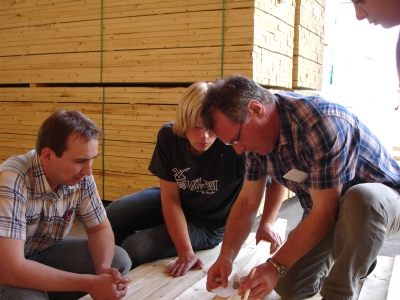TFT Woodexperts Blog
Blog
Skills: Accentuate the Positive
It’s not often that a song made famous by Ella Fitzgerald comes to mind when thinking about the shortage of wood skills currently hampering construction. Yet ‘Accentuate the Positive’, as the song title encourages, is what we must do to attract more school and university students into our sector.
Main contractor Laing O’Rourke set out a 10-point plan to address the construction skills crisis some months ago, calling for ‘Design, Engineer & Construct’ (DEC) subjects to be offered in schools through specific GCSEs and A-levels. Technician-level qualifications in ‘practical’ subjects have certainly lost out over time to full degrees, yet they are still vital to the well-being of the construction industry. But does the image of construction as a career choice stand up to young people’s scrutiny in the digital age?
Wood comes into the design & technology curriculum under ‘resistant materials’. Children allowed to experiment with wood in designing products, and teachers mentoring the experience, often have positive experiences, engendering a lasting enthusiasm for wood. One successful campaign which captures and capitalizes upon that positivity is the British Woodworking Federation’s ‘Wow! I Made That’ apprenticeships promotion, designed specifically to harvest a new generation of employees for joinery producers.
At university level, wood has a much more positive image than general construction, due to its easily comprehensible environmental benefits and its flexible design capabilities. Yet here again, teaching of wood science & technology needs to be vastly increased if the construction and forestry industries want to reap the full commercial benefit of a generation of architects and engineers who actually know how the material works and can use it to full effect.
Wood suppliers and other trade bodies, like the Builders Merchants Federation, offer wood training and qualifications, but by and large only to those already in the business, rather than using wood as an attractive career path in its own right. Once in the industry, the prospect of winning awards, such as Timber Trades Journal’s Career Development Award, accentuate the positive aura around career progression. The entry deadline for 2017’s Career Development Award is 21st July. In previous years, many of the entrants and winners have received training with TFT Woodexperts.
It is surely to everyone’s benefit in the wood sector to take every opportunity to accentuate the positive message of sustainable wood and its considerable design, structural and climate change potential. Which age range we decide to prioritise with our positive messaging, and the level of connectivity between school, university and employer opportunities with which we do so, will dictate how swiftly we are able to close the wood skills gap.
16 2017

